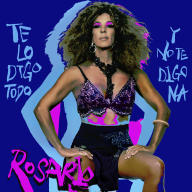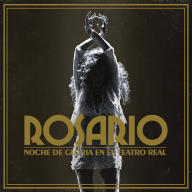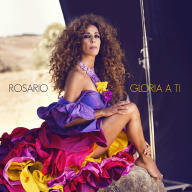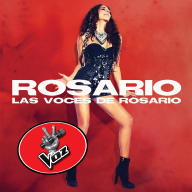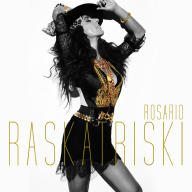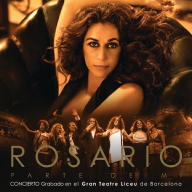The daughter of Antonio González (aka El Pescaílla), a musician, and Lola Flores, a dancer, singer, and actress, and the sister of Lolita Flores, an actress, and Antonio Flores, a singer/songwriter. Rosario was born on November 4, 1963, in Madrid. She began her career in the mid- to late '70s; billing herself as Rosario Rios, she recorded ¿Que Querrá Decir Esto? (1976) for CBS and acted in the film Al Fin Solos, Pero... (1977). Not much came of her efforts during this period, and her career went cold until 1984. In that year she acted in a made-for-TV Spanish miniseries, Proceso a Mariana Pineda, and recorded another album for CBS, Vuela de Noche.
Rosario continued acting in the years that followed, but didn't record another album until 1992, when Sony Discos released De Ley. Co-written by her brother Antonio, De Ley was a major success in Spain, spinning off a couple big hits ("Mi Gato" and "Sabor Sabor") and warranting a follow-up. Siento (1995) proved to be an even greater success, and not just in Spain, and its hits ("Estoy Aquí," "La Estrella") charted internationally. As before, most of the album was co-written by Antonio. For the next album, Mucho por Vivir (1996), Rosario either wrote or co-wrote the songs herself, with notable input from one of her co-producers, Fernando Illán. Mucho por Vivir didn't match the success of Siento, but it did manage one major hit, "Yo Te Daré," that charted internationally. Rosario's next album, Jugar a la Locura (1999), again found her penning the songs herself. Also of note, Jugar a la Locura showcases an electronic production style that was very trendy for its time; however, this didn't amount to commercial gain, as the album met a lukewarm reception, furthering the slide in popularity for her that had begun an album earlier with Mucho por Vivir.
Consequently, Rosario surrendered some of the control over her next album, Muchas Flores (2001), to professionals, most renowned among them singer/songwriter Jorge Drexler and producer Cachorro López. The end result was ideal, as Muchas Flores became a hit with critics as well as consumers. This grand comeback rejuvenated Rosario's career as an actress in addition to her recording career; the following year, she appeared as Lydia González, a bullfighter in Hable con Ella (2002), an acclaimed film by legendary Spanish director Pedro Almodóvar. The role was major and capped off Rosario's return to celebrity; won the Golden Globe and was nominated for an Oscar.
In the following years, she continued her singing career, recording successful albums such as De Mil Colores (2004) and Contigo Me Voy (2006) for Sony. Her efforts were recognized by the Latin Grammy voters, who regularly nominated her for Best Pop Vocal Album, Female: she won in 2002 and 2004, for Muchas Flores and De Mil Colores, respectively, and though she didn't win in 2006 for Contigo Me Voy, she was nominated. Rosario returned in 2008 with her seventh album, Parte de Mí, paying tribute to some of her musical inspirations including her mother, Lola Flores. Followed by 2009's Cuéntame, Rosario delivered her ninth studio album, Raskatriski, in 2011. The following year she delivered the charting single "Gipsy Funky Love Me Do," a duet with Tony Baez that was produced by Narada Michael Walden. The track was a rhumba interpretation of the Beatles' hit, "Love Me Do." The same year, Universal Spain issued Las Voces de Rosario, a compilation of her best duets. 2013's Rosario was nominated for a Latin Grammy for Best Pop Vocal Album. While she busied herself with touring, coaching on La Voz Kids in Spain and Mexico, and other reality talent programs for the next couple of years, she did return to recording with 2016's Gloria a Ti. Posing on the cover in one of her mother's recital dresses, it was a heartfelt tribute to her musical family that marked a clear return to the influence of flamenco. The following year she delivered Noche de Gloria en El Teatro Real, a massive 24-track live offering that featured guest spots by some of the most popular singers in Spain including India Martinez, the electronic group Taburete, Nina Pastori, and Marta Sanchez, to name a few. ~ Jason Birchmeier, Rovi


